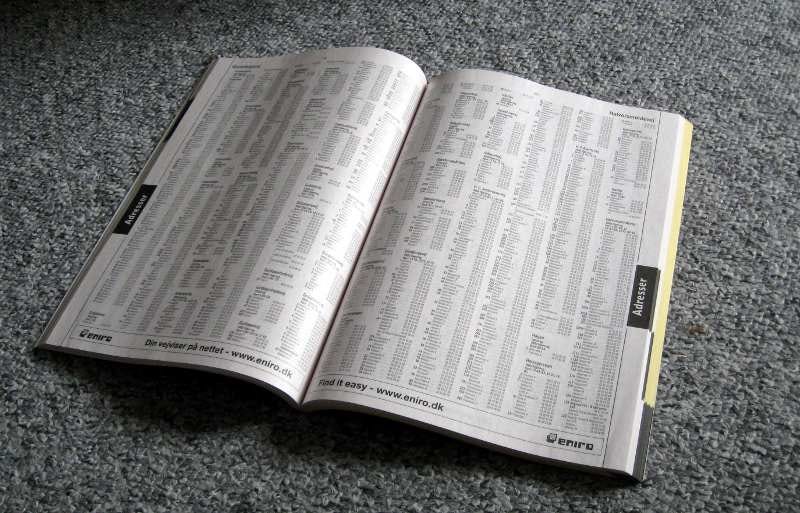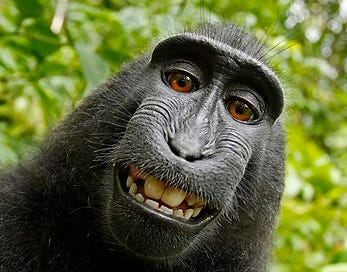Monkey Selfie, AI, and Human Agency
Quid ex Machina, Act I Scene 2. Theme song by Led Zeppelin
This is the 3rd essay of the series Quid ex Machina, which examines deep, under-explored, and Unseen impact of AI on humans and our societies. See here for the rest of the series.
Today’s theme song is Stairway to Heaven by Led Zeppelin.
Prologue
With every creation comes a copyright. You carefully posed yourself in the soft light at dawn and snapped a selfie, you own copyright of that selfie. Simple as that.
But if your pet cat walks over your phone’s camera screen, and snaps a selfie of herself, who owns copyright of that cat selfie?
Silly question. You may think. Why does it matter? Who cares if an animal takes a selfie?
Turns out, this animal-selfie-copyright question matters a great deal. A case even went up to an US Circuit Court – just one level below the Supreme Court.
What’s more, this question is in the direct fire line of a low-profile AI copyright lawsuit. It is a lawsuit that challenges our concept of agency, and poses many practical and philosophical questions that are still under the radar.
Before diving in: I am not a lawyer. Nothing here is legal opinion or advice, or should be construed as such. Everything is based on my personal experience, research, and consultations with experts. This essay is for information and entertainment purposes only. Take everything I say with a pinch of salt.
Does a Monkey Own Its Selfie?
In 2008, when David Slater, a UK wildlife photographer traveled to Indonesia to document an endangered species of wild monkeys (Celebes crested macaques is the proper name), he would never imagine that he was heading into a prolonged copyright battle.
Slater befriended some monkeys in their habitat, and set up his camera gears with wide-angle lens attached, autofocus set, and remote shutter control wired. Soon, the curious primates started monkeying around the camera set. One monkey named Naruto played with the remote shutter control, and the camera captured many of Naruto’s smiling moments.

Slater left Indonesia with many close-up shots of the endangered macaques. He published these photos – including Naruto’s selfies – and got good press in major media outlets. All was well.
Until People for the Ethical Treatment of Animals (PETA) sued him in the US1.
PETA claimed that because the monkey Naruto triggered the shutter, Naruto should hold copyright of those selfies. Slater fired back: he befriended the monkeys, and labored over camera setups so that Naruto could snap selfies. His human decisions made Naruto’s monkey selfies possible.
You’d be right to call this lawsuit a monkey business. Indeed, it was dismissed. The court said, “No, animals cannot hold copyright. No human creator? No copyright.”
[T]he Copyright Act does not “plainly” extend the concept of authorship or statutory standing to animals. To the contrary, there is no mention of animals anywhere in the Act.
— Judge Orrick, Naruto v. Slater N.D. Cal. 2016
PETA appealed to the Ninth Circuit Court, just one level below the US Supreme Court. The circuit court confirmed the dismissal: if there’s no human creator, there’s no US copyright for the creations.
The drawn-out legal battles broke Slater, but he stayed with wildlife photography. On his public Facebook page, across the face of a grinning Naruto, a prominent watermark reads “Copyright David Slater” for the photos’ UK copyright. Meanwhile, in the US, Wikimedia Foundation lists the same image under Public Domain license – Naruto is not a human, so Naruto’s selfies have no copyright.
A work must be created by a human to be copyrightable. This is a baseline in US copyright. But an AI copyright lawsuit is challenging it.
AI “Creator”?
Led Zeppelin knows a stairway to heaven and its copyright status, and Dr. Thaler’s AI image-generator knows an entry to paradise. Since 2018, Dr. Thaler has tried to register copyright for A Recent Entry to Paradise, an AI-generated image without human input. Each time, his registration request was denied.
The reason for denial stays the same:
Machines do not and cannot hold copyright. Only human beings can hold copyright, as the US Copyright office (USCO) spells out in iron-clad language.
To qualify as a work of 'authorship' a work must be created by a human being.... Works that do not satisfy this requirement are not copyrightable. The Office will not register works produced by nature, animals, or plants.
— Compendium of US Copyright Office Practices. Emphasis by the author.
USCO then gives specific examples of non-copyrightable work: photos taken by a monkey, paintings by an elephant, and any works “produced by a machine or mere mechanical process…without creative intervention from a human”.
In June 2022, after being denied three times for copyright registration, Thaler sued the Office of Shira Perlmutter, head of the USCO. Thaler claims that Naruto v. Slater was dismissed based on a legal technicality2, rather than the fact that only human-created works are copyrightable. He wants the USCO to register copyright for that AI-generated image. USCO stands its ground: there are plenty of legal precedents to support the human-author requirement, and the final Naruto v. Slater ruling does say human creation is required for copyright.
Thaler v. Perlmutter is still pending, and I’m keeping close watch. Because this case goes beyond copyright — it is about our concept of agency.
But how is copyright related to the philosophical question of human agency? Before answering this question, we need to understand: what makes a particular work copyrightable?
Whence Creativity?
Everyone creates all the time: our Ice Age ancestors painted in caves, Roman poets wrote odes, native Americans crafted pottery, I took photos of yesterday’s snow…These creations raise lots of questions. What makes a particular work creative? Does a creative work say anything about the artist? What does it mean for a person to be creative? And so on.
Despite all this, creativity is not a major topic in philosophy. As an abstract concept, “creativity” did not exist in our vocabulary until the 19th century. Sure, Plato had Socrates speak of Muses divinely inspire great poetry, Aristotle thought poetry-writing is a rational activity, Kant offered theories about artistic geniuses…But in philosophy, creativity is a side kick to major shows like free will, consciousness, and knowledge.
Yet creativity is often a focal point of USCO and Supreme Court – because, copyright.
For example, the US Supreme Court has spoken about alphabetically ordered telephone directories. They are not copyrightable, no matter the time and energy you invest into making them — because there is no creative expression. People’s names and phone numbers are facts, not creative choices, and facts are not copyrightable. The alphabetically ordered compilation is not a creative choice either.
[T]he Constitution mandates originality as a prerequisite for copyright protection. The constitutional requirement necessitates independent creation plus a modicum of creativity.
— US Supreme Court, Feist Publications, Inc. v. Rural Telephone Service Co., 1991. Emphasis by the author

In short: no creativity, no US copyright. But what is required for creativity to happen, to make something creative and eligible for copyright?
When we say a work is creative, we are are attributing that work to a creator: someone (named, anonymous, or pseudonymous) who reflected on their intentions and ideas, and took actions to make that work. Would you say a special snowflake is creative? How about a triple rainbow? They are beautiful and original phenomena, but no one has done anything to make them: they just happen in nature. What makes a work creative,3 is the creator’s actions and reflections shown through the work,
So, we need a creator who’s capable to take actions, and to reflect on those actions. We call this capacity agency. All the creativity we encounter comes from creators’ exercise of their agency. No agency, no creativity.
But we can exercise our agency all the time, and still not making anything creative and eligible for copyright protection. So what’s special about copyright?
Philosophical Roots of Copyright
In part 1, we covered a very brief history of copyright: how it started as a publishers’ private privilege, then evolved into a public grant available to any creator.
But this history doesn’t answer why. Why did copyright evolve into a creators’ exclusive right? For that, we need to look into copyright’s philosophical roots.
[E]very man has a “property” in his own “person.” … Whatsoever, then, he removes out of the state that Nature hath provided and left it in, he hath mixed his labour with it, and joined to it something that is his own, and thereby makes it his property.
— John Locke, Second Treatises of Government, 1689
In the opinion of 17th century English philosopher John Locke, the only thing we own and control is our physical bodies. Everything else belongs to nature, and we need to “mix our labor” with nature to make something our own.
An apple on a public tree? No, that apple is not yours.

Picking it from the tree, then the apple is yours. It becomes your property, only you can decide who can do what with the apple.

Copyright functions in a similar way. Loves London? London is not yours. But using your creative labor to set a thriller in London, the story’s London setting is yours. It becomes your property, so only you can decide who can copy, distribute, or adapt it.
19th century German philosopher Hegel took it further. Not only do we control our physical, tangible bodies, said Hegel, we also control our intangible ideas, feelings, and experiences. When we “direct [our] will” to change objects around us, our feelings, ideas, experiences, and personalities become infused into these objects, and give them “meaning and soul”. Effectively, these objects become extensions of ourselves.
A person has the right to direct his will upon any object, as his real and positive end, the object thus becomes his. as it has no end in itself, it receives its meaning and soul from his will.
— G. W. F. Hegel, Elements of the Philosophy of Right, 1821
This essay is an extension of myself, my feelings, and personality. Books, paintings, and music are extensions of artists, their feelings, and personalities. This is why distorting an artist’s work is akin to violating the artist as a person. By protecting an artist's works from distortions4, copyright protects the artist as a person.
Both Lockean and Hegelian roots of copyright demand us to act, to “mix labor,” to “direct will” upon objects. We all have the capacity to act — it’s called agency. But until our actions give objects “meaning and soul,” and make them into extensions of ourselves, what we’ve done is not creative enough for copyright protection.
This is why copyright is special. This is how the seed of copyright is in human agency.
Human Agency, in the Age of AI
When we ask if a work is copyrightable, we are asking if the creator of that work has exercised their agency to give the work enough meaning; and we always presume that human creators have agency. Now that AIs can generate images that look like they are painted by humans creators, does this mean AIs have agency too? That’s what Thaler v. Perlmutter et al is getting at. It is asking a court of law to answer a philosophical question:
AIs behave as if they have agency. Do they actually have agency?
No matter the court’s answer, more questions are already on the way.
Agency is required of creativity, so when we praise a creative work, we are praising the artist who exercised their agency and deserves the praise.
So who exercised their agency to create, and deserves our praise, when we praise AI-generated images? Algorithms? Software engineers? Prompt texts? Artists of training images? Prompt writers? Company that owns the AI? Nobody knows.
Copyright protects an artist as a person, by protecting the artist’s works. So if AI-generated images were copyrighted, who’s the artist that deserves to be protected as a person? Are those images extensions of any person, or the company that owns the AI? If those images were distorted, whose person is violated and can bring a lawsuit?
All questions circle back to a who, because our philosophies have always centered on humans, and believed that humans are unique. But with AIs behaving as if they were human, our philosophies are being challenged. After all, what makes human unique?
The reflective nature of our agency is distinctly human. All animals are capable of taking actions, but only humans are capable of reflecting on our actions.
No animal other than man, however, appears to have the capacity for reflective self-evaluation that is manifested in the formation of second-order desires.
– Harry Frankfurt, Freedom of the Will and the Concept of a Person, 1971
Through the reflective quality in human agency, we have created artworks with meaning, and built AIs that are now confronting our concept of agency.
It is also through this reflective nature of human agency, that we ask ourselves time and again: what are the yet Unseen impact of AI on humans and our societies?
And that’s what I plan to do in the coming several weeks. We’re done with AI and copyright for now, and we’ll look through other lenses.
Thank you for reading Earthly Fortunes. If you like it, please share it. Subscribe for free to find out more about the Unseen impact of AI on humans and our societies.
I’d love to hear your thoughts about AI and human society! Let me know in the comments, DM me on Twitter or Instagram, or just reply to the email!
Even before PETA, Slater and Wikimedia Foundation had been in dispute over those monkey selfies' copyright, but it was Naruto v. Slater that gave Slater the most pain.
That animals have no standing to sue for a copyright claim.
But if we consider God as the ultimate creator, and beautiful new natural phenomena are results of God’s actions, then the triple rainbow and special snowflake are creative.
The technical term is “moral rights”.






Brilliant Helen! You've expanded my thinking. I appreciate your reflections on creativity, copyright, and AI through the lens of Kant, Hegel, and Locke. It's refreshing to take a step back from all the current buzzy press on AI and take a moment to ask the philosophical questions.
Oooh loving Led Zeppelin, listened while I read.
“Turns out, this animal-selfie-copyright question matters a great deal. A case even went up to an US Circuit Court – just one level below the Supreme Court.”
Damn, PETA doesn’t mess around lol
This whole essay is wild. PETA, philosophy, creativity, AI. You did an exceptional job making this entertaining and educational.
"AIs behave as if they have agency. Do they actually have agency?" 😵💫